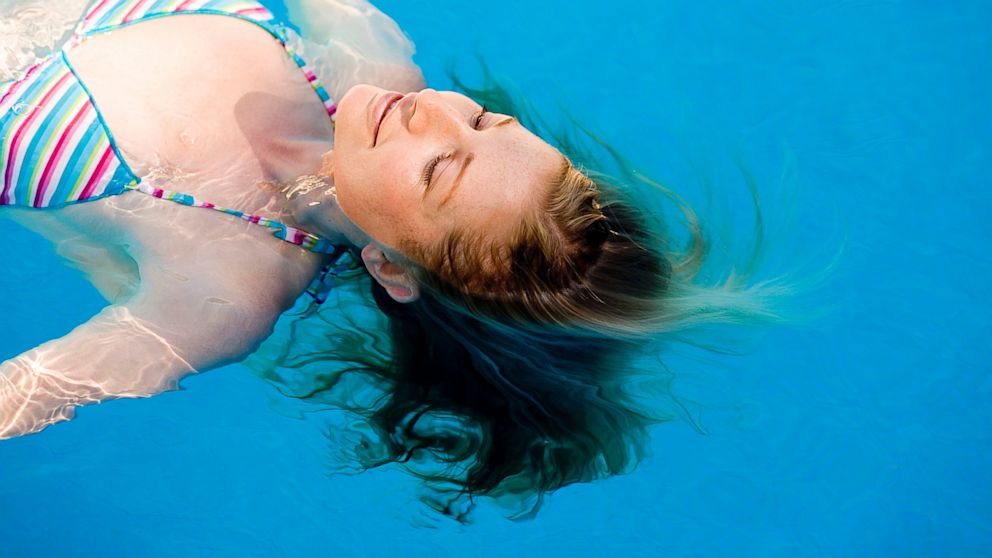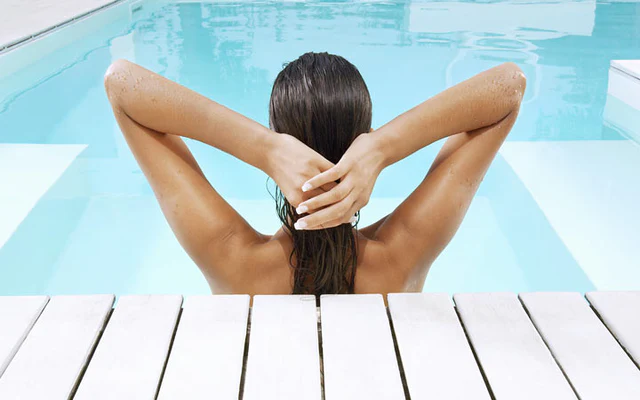In the summer, there’s almost nothing better than a refreshing dip in the pool. It might be tempting to dive right in, hair and all, but there’s reason to think twice about this. Chlorinated water is the arch-nemesis of healthy hair, and exposure can leave your hair dry and damaged. While no amount of chlorine exposure is good for your hair, it doesn’t necessarily mean you have to sit poolside all summer. There are a few tricks that can help protect your hair while swimming and decrease the possibility of frayed, brittle hair.

Understanding Chlorine’s Impact on Hair
Chlorine is an antimicrobial and algicidal chemical often used to keep pools clean. Unfortunately, every time you submerge your hair in chlorinated water, damage is unavoidable. When your hair comes in contact with chlorine, it strips away natural oils, frays hair cuticles, and makes “your hair more prone to external damage,” says Dr. Madalyn Nguyen, DO, a dermatology resident. Chlorine exposure can leave you with dry, brittle hair if you don’t take precautionary measures.
If you have dyed blonde hair, you’ll face another problem: chlorine can turn your blonde hair green. It’s no myth, and it’s a situation no one wants to be in. This happens when the pool you’re swimming in has copper. “Chlorine actually oxidizes the copper, and then that compound attaches to the hair, causing it to turn green,” Nguyen explains.
Preventative Measures for Hair Protection
To protect your hair from chlorine damage during the outdoor swim season, the best thing you can do is avoid contact with chlorine altogether, Nguyen suggests. This means forfeiting putting your head underwater unless you choose to wear a swim cap. Although they may not be the most stylish, swim caps are effective at blocking exposure to chlorinated water.
Another way to decrease the likelihood of chlorine damage is to rinse your hair with fresh water before and after getting into the pool. If you think of your hair as a sponge, the more freshwater your hair absorbs before you enter the pool, the less chlorine can penetrate your hair follicles, Nguyen notes. Before jumping into the pool, you can also try coating your hair with coconut oil. Oil and water don’t mix, so lining your hair with oil will deflect the chlorine water from being absorbed into your hair.

Post-Swim Hair Care Tips
After spending the day at the pool, prioritize washing the chlorine out of your hair. “The longer the chlorine is in contact with your hair, the more damage it’ll cause,” Nguyen says. Try rinsing your hair with a light, mild soap in lukewarm water. Additionally, if you’re blonde and your hair is turning green, you can use a chelating shampoo. The chelating shampoo is effective at latching onto metal molecules that your hair was exposed to while swimming. By removing these harsh metals, chelating shampoo helps to prevent any unfavorable change in hair color.
